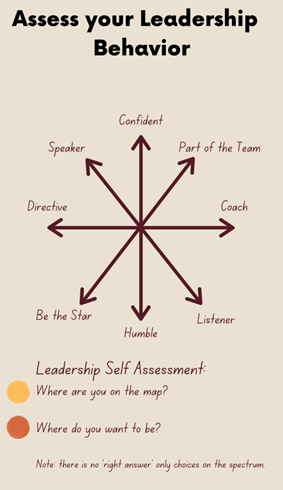November 28 2022 at 03:00AM
Leadership series – The pillars of Leadership

In our previous article, we wrote the why of Leadership and its many techniques. The different styles are known to this audience, but we rarely talk about what they have in common and what the base of Leadership is.
Any leader must arm themselves with critical skills of their function and find the right balance among those, according to the situation. We define the following skills:
- confidence vs. humbleness,
- speaking vs. listening,
- directing vs. coaching,
- team player vs. being the star.
In work psychology, there is a theory that says that we live in a world where we have the tendency to not only take care of where we lack but accept that we can't be good at everything and be aware of our strengths and capitalize on them.
But each of us has our strengths and weaknesses. It helps us be honest with ourselves and get a clear picture of our soft skills status (here you can find our previous self-evaluation article). Once you get a snapshot of the current situation, you can start to work on your weak points and reinforce your strong points.
A balanced leader should know their strengths and weaknesses and use the knowledge to their advantage.
The main struggle many faces is not knowing where to start to make a change. Here are a few tips I gave and received throughout my career you can adapt to diverse situations.
Are you too humble? You may have the tendency to deem your voice and sound less confident. Humility is a precious skill, but only if it keeps you grounded and not down. Make a list of your strong points and prepare your day by looking at your tasks and meetings with a personal agenda: "What would you like as the outcome of a meeting? How can you get there?" Preparing this list, you will already have a rehearsal of what the discussion could look like, and being more prepared naturally helps you to voice your concerns or desires.
Are you a great speaker but not so much of a listener? Put a post-it on your screen or desk at work, or write a small daily reminder in your agenda to make a point to listen for at least one meeting a day. Take notes of what you are hearing: this will focus your attention on who is speaking, and you will avoid distracting yourself by thinking already about an answer.
Are you a great decision-maker but need to become more familiar with coaching? Learn the power of asking the right questions. Write them down, elaborate your thought process, and prepare your meetings for this moment. Asking questions will help your audience reach the same point where you want to bring them by themselves without you directing them and giving them the answer and will also teach them something.
Do you have problems sharing the spotlight with your colleagues? Learning from each other and working as a team is one of the most important skills of a leader and should not be overlooked. Try to involve someone you trust in a project where you could learn something from each other and be honest about your difficulty in delegating and collaborating; your colleague will understand and help you learn what you are missing. At the same time, be ready to give credit to the people around you for their great contribution, as much as you should take credit for your work.
If the points above have made you curious, you may want to learn more about building your Leadership Skills or coaching others in building them. If so, check out this link.



